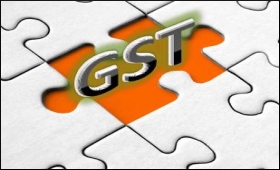|

|
'Excise, VAT exempted goods by states should be GST exempt'
|
|

|
|
| Top Stories |
 |
|
|
|
SME Times News Bureau | 30 Aug, 2016
India Inc on Tuesday proposed that goods fully exempted from excise duty
and VAT by states should be categorised as exempted goods in the GST
regime, which is likely to be implemented after a minimum of six months
from the date of adoption of the GST law by the GST Council.
"Goods
fully exempted from the levy of excise duty and VAT by all the states
be categorised as exempted goods in the GST regime as well," Federation
of Indian Chambers of Commerce and Industry (FICCI) said in a release
following a meeting here with the Empowered Committee of State Finance
Ministers on the Goods and Services Tax.
"Goods chargeable to nil
rate of excise duty but charged to VAT in most states could be
identified for levying a merit rate of GST. All other goods (except
jewellery and demerit goods) could be subjected to the standard rate,"
the statement said.
"As per current indications and reports,
goods will be categorised as being subject to merit rates (12 per cent),
standard rates (18 per cent) and de-merit rates (40 per cent). Certain
goods will be exempt from GST while bullion and jewellery would be
charged to 1 per cent/2 per cent," FICCI added regarding classification
of goods for applying GST rates.
Industry chamber CII
(Confederation of Indian Industry) addressing the Empowered Committee
hoped that the GST rate would be kept at 18 per cent.
"GST is a
game-changer for India. We hope that the standard tax rate would be kept
at a reasonable level of 18 per cent which would greatly contribute to
growth, employment and incomes, and boost Indian industry's global
competitiveness," Chandrajit Banerjee, Director General, CII said.
Ficci
suggested that with a view to check inflation and check the tendency to
evade taxes "the merit rate should be lower and the standard rate
should be reasonable".
On implementing GST, FICCI said that in
order to provide adequate time to trade and industry to prepare "for a
hassle-free roll out of the GST regime", a minimum of six months time
should be permitted from the date of the adoption of the GST Law by the
GST Council.
"Additional time would be required in case the GST
Law as passed by parliament or state legislatures is significantly
different from the one adopted by the GST Council," FICCI said.
FICCI
also requested the empowered committee that certain existing exemptions
such as the area based exemptions under excise legislation and
incentives under states' industrial policies should be converted into an
effective, non-discretionary tax refund mechanism.
The industry
body further recommended that valuation provisions under GST, which is a
transaction based tax, should give primacy to actual transaction value.
"Valuation
provisions under the draft GST laws are reflection of valuation laws of
a single point tax like excise duty. Wide powers have been given under
the draft GST laws to authorities to reject declared transaction value,"
the statement said.
CII President Naushad Forbes said that GST
Law should provide for seamless movement of goods without any rigid
administrative requirements that will delay transit and add to costs.
"There
should be a foolproof mechanism of movement of goods between states and
a single registration process, and industry should not be subjected to
dual administration of assessment, audit, etc both by the Centre and
states," Forbes said.
In a meeting here with Revenue Secretary
Hasmukh Adhia earlier in August, Indian industry chambers had raised
concerns on the draft GST law, flagging issues like dual administrative
control and wide discretionary powers for tax authorities.
"Provisions
may lead to unwarranted disputes in future so it requested to give a
re-look at the law before finalising," a FICCI representative told
reporters here after the meeting.
|
|
|
| |
|
|
|
|
|
|
|
|
|
|
|
|
|
|
| |
| Customs Exchange Rates |
| Currency |
Import |
Export |
US Dollar
|
66.20
|
64.50 |
UK Pound
|
87.50
|
84.65 |
Euro
|
78.25
|
75.65 |
| Japanese
Yen |
58.85 |
56.85 |
| As on 13 Aug, 2022 |
|
|
| Daily Poll |
 |
 |
| PM Modi's recent US visit to redefine India-US bilateral relations |
|
|
|
|
|
| Commented Stories |
 |
|
|
|
|
|
| |
|